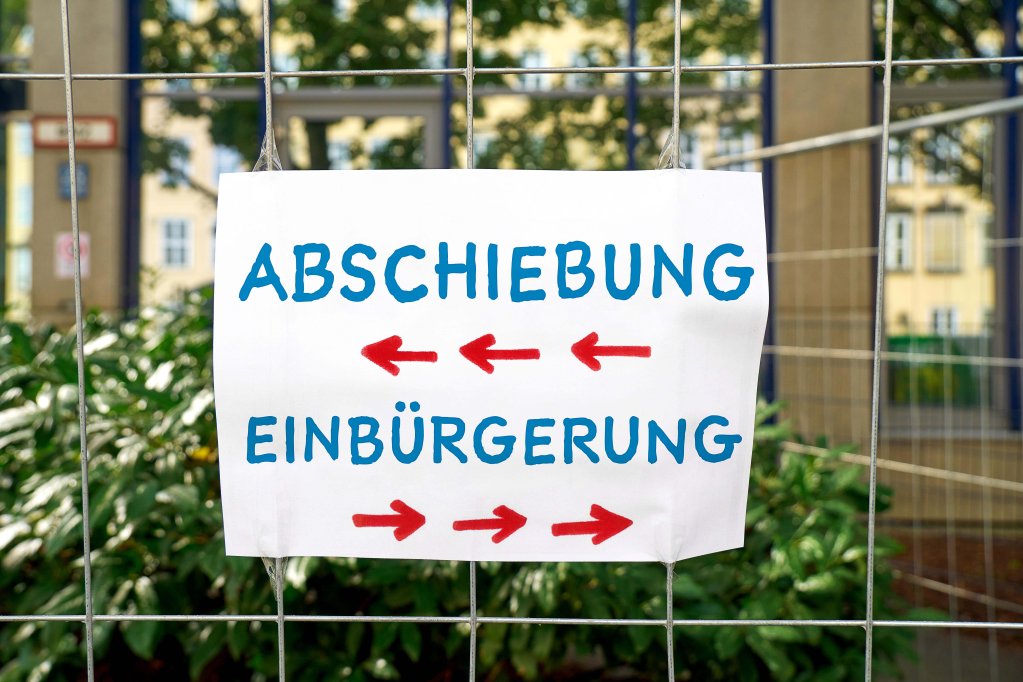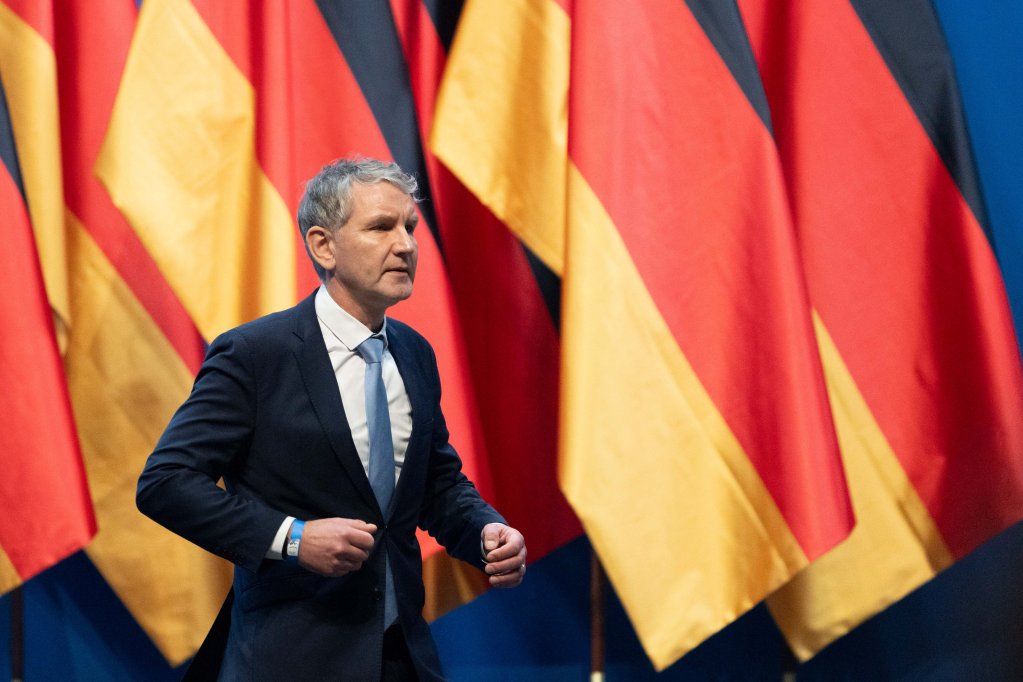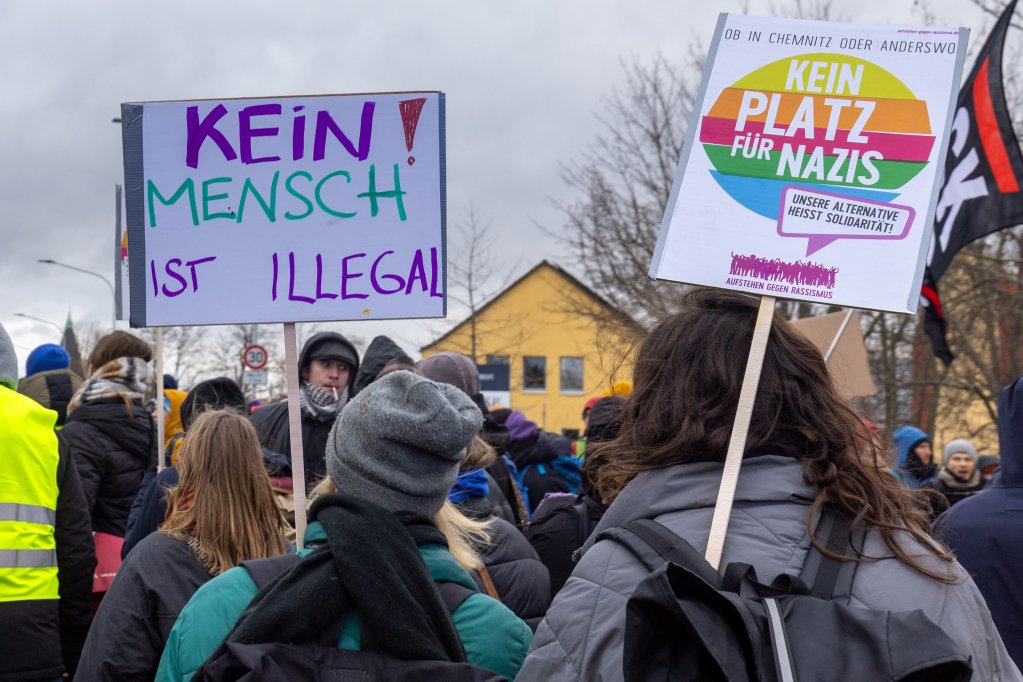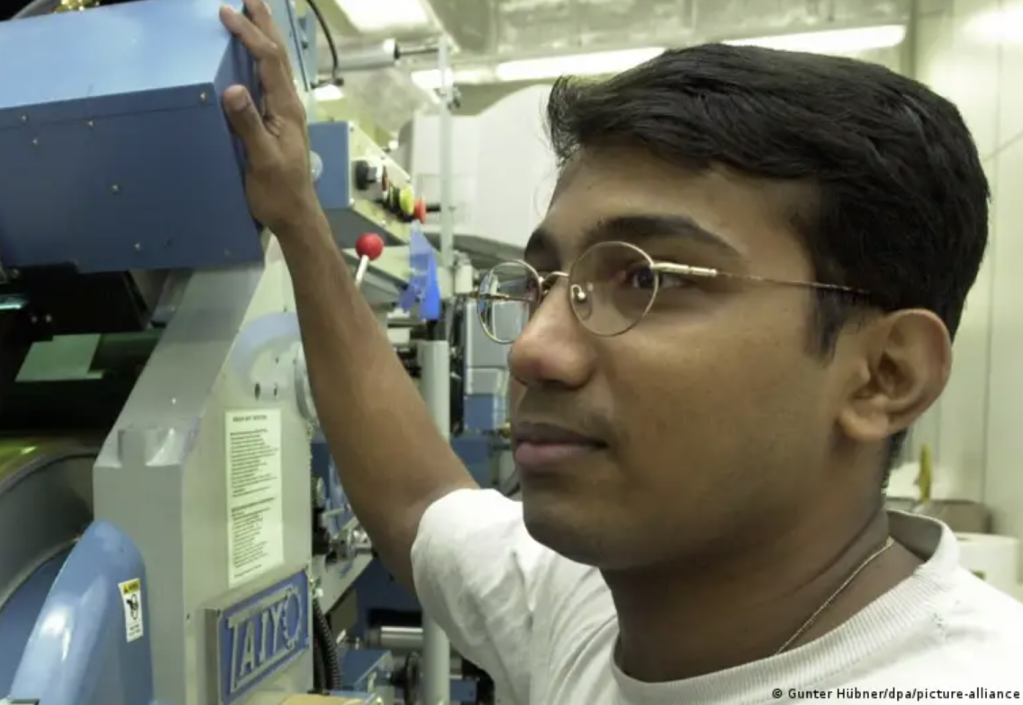With snap federal elections slated for February 23, InfoMigrants takes a look at the election manifestos of Germany's top seven political parties in terms of migration. Today we look at the AfD (Alternative for Germany) party who position migration and asylum as part of their security policy.
For the upcoming German elections, InfoMigrants takes a closer look at where the top seven political parties stand on migration and asylum policy. Thus far, we have published a summary of the Conservatives (CDU/CSU) policy proposals; we will also publish overviews on the SPD, Greens, BSW, FDP and Left party within the next few weeks.
The right-wing and anti-migrant party Alternative for Germany (Alternative für Deutschland, AfD) presented its full election manifesto at its party conference on January 11 and 12 this year. The party is the furthest right on the political spectrum among the parties allowed to stand in this year's elections. They also have a Chancellor candidate in the form of co-party leader Alice Weidel. Currently, the party ranks second place in opinion polls behind the conservative CDU and is predicted to win about 21 percent of the vote.
Overall, the manifesto promises Germans "wealth and better living standards", "security" and "unity." The party’s migration and asylum policies mainly come under the heading of security.
Like all party manifestos, the AfD mixes analysis of the current situation with its proposals for change. The methods proposed (withdrawing from some international and European treaties) and the language used in their program are perhaps where the party differs most starkly from the other parties in terms of migration, which is portrayed in a largely negative light.
"German nationality should not be given as a gift," states the party for instance, promising to toughen up rules around residency and nationality and protect Germany above all else. They also want to return the rules of German nationality to pre-1990, when you needed at least one German parent before a child could acquire German nationality.

It is worth noting that despite its current success in pre-election polls, all of the other major parties have ruled out working with the AfD. So, barring a landslide victory, which would be very unusual in Germany, which has been ruled by various coalitions for years, the AfD is unlikely to gain power.
Close down the 'asylum paradise'
In broad brush strokes, the AfD promises to "regulate migration, close the 'asylum paradise' down, operate a tougher returns policy, push for integration and attract skilled migrant labor." The party says that it believes that the "material benefits for asylum seekers in Germany are too high" and they say this is putting a "strain" on Germany and its economy.
Here are the main proposals:
- AfD claims that the cost of current asylum policies is in the "tens of billions." To that end, the party proposes that "asylum processes and asylum applications for subsidiary protection are made and processed in a country outside Germany."
- They also say there will be "no more migration quotas or participation in European solidarity quotas."

- The AfD wants to end the federal admissions program for Afghans at risk and states it would set up a committee to investigate the "Afghan local hire scandal," referring to Germany's role in the handling of people who were employed by the German government or military in Afghanistan and then later found it difficult or impossible to qualify for a visa to leave Afghanistan when it fell to the Taliban.
- The AfD is against private sea rescue organizations working in the Mediterranean, many of which are German-funded and based. Instead, they say they would seek agreements with North African countries so that those countries would accept any rescued migrants. No details were given on how such arrangements might be obtained, given that the Tunisian leader has already stated that he will not accept the return of third-country nationals on his territory.
Asylum and refugee status
- Under an AfD government, only asylum applications alongside documents proving someone’s identity and the country from which they come would be accepted.
- Anyone who gave false information on a form would lose their right to apply for asylum.
- The party would "increase the number of 'safe countries'" to which Germany can return people.
- They would remove the automatic right to family reunification for those with subsidiary protection status.
- Even those with recognized refugee status would only be allowed to apply for permanent residency in Germany after ten years. This, the party says, should be linked to an annual test over whether the conditions for the granted protection are still needed.
- The AfD says it would put people who are applying for asylum in special centers where they would have to stay for the duration of the application process
Read AlsoGermany: Who are the AfD's immigrant voters?
Returns
According to the AfD, a completely new approach to returns would benefit Germany. This, they say would apply both to sending people back to their country of origin, as well as returning people via the Dublin procedure to the first EU country through which the asylum seeker entered the bloc.
- "Consequent returns," would end the practice of "Duldung," which is the suspension of a deportation order, allowing individuals to remain in Germany even though they either don't have the legal right to stay or have been instructed to leave but cannot be deported. This could be due to a lack of an agreement between countries, missing travel documents, or safety concerns preventing their return to their home country.

- The AfD says it will seal more deals by placing "massive pressure via economic sanctions, holding back of development aid or visa policies" on third states who are not so willing to take their nationals back.
- Anyone found to have committed a crime, or to be a danger or an extremist would be sent back, either to a third country or to their home country "immediately" and "without question."
- The right to church asylum would be removed and the agreement between the Federal Office for Migration and Refugees (BAMF) and the churches "would be canceled."
Syrians
In the AfD's opinion, there is no longer any danger of civil war in Syria. The program cites a ruling from an administrative court in Münster in July 2024, which found there is no longer a serious, individual threat to the lives or physical integrity of civilians in Syria due to the civil war. Based on this assessment, the party wants to proceed with the following measures:
- The AfD would push for all Syrian nationals who committed crimes or are seen as a danger to have their protection status removed and sent back.
- Anyone with subsidiary protection would no longer be able to renew it.
- They would discuss with the new Syrian authorities how best to return Syrian nationals to their country.
- They would also begin an "aggressive advertising campaign to encourage the voluntary return of Syrians to Syria."
Read AlsoGermany: Financial incentives offered to Syrians to return home

'Protecting' German culture and language
In its manifesto, the AfD paints a picture of Germany where many things are getting worse for its citizens and it is losing power on the international stage. By implementing its manifesto, the party promises all that will change.
The party believes Germany is becoming more unattractive on the international stage, at least to the big economic hitters and skilled workers the AfD hopes to attract.
The AfD wants to ensure that German culture is "protected." In the section culture and media policy, the first point on the agenda is the so-called "Leitkultur," or leading culture. This refers to an idea that Germany or European countries need to somehow 'protect' their own cultures and impose that as the leading one for the whole society, so that the values and morals seen to be inherently 'German' are the ones that everyone is expected to adopt.
Further down on that same list, the AfD underlines "protecting the German language," as an important building block in its culture and media policy.
'Accommodation crisis'
The AfD claims that in "many parts of Germany, uncontrolled migration is causing an accommodation crisis." The party says it wants to change the building laws so that it can "free the German population from its shackles" and allow "each German citizen to build their own four walls instead of living as renters."
In terms of who gets access to these future building plots, the AfD says that "natives will take precedence." In this context, the program doesn’t offer a definition of 'natives', but the inference appears to be that German citizens will get priority over migrants.

The party also says that in areas where accommodation is difficult to find and there is a lot of demand, the number of asylum seekers who are allowed to live in certain areas should be capped.
In other areas, where more than 25 percent of residents are non-EU migrants, or where there are "high levels of criminality," where the AfD judges that "integration hasn’t worked," asylum seekers or those with protection would no longer be able to apply to live there, or not in big multiple occupancy houses.
Read AlsoEPP calls for progress on repatriation hubs outside EU
Welfare to work
- Within the long list of rules the AfD proposes to make the welfare system more functional, they suggest withdrawing refugee status from any refugee who returns to their home country.
- Any "foreign nationals" in Germany should only be able to receive one year of social welfare before it is capped, and top-up social benefits should only kick in after five years in Germany, according to the AfD.

- The AfD also suggests that Ukrainian citizens, who are currently able to receive welfare benefits like any German resident, should be given the same level of benefits as other asylum seekers, and not receive the slightly higher payment reserved for residents. They should also be encouraged to work.
- When talking about how to improve the German health system, the AfD believes that the qualification levels and German knowledge need to be improved for foreign nationals working in the healthcare sector. The party also wants to create more medical study places that would be reserved for German citizens, because they believe there is a deficit of places at the moment.
- Under an AfD-ruled country, the party says it would make sure that asylum seekers had access to "payment cards" and that all their benefits would be concentrated on this one card.
- Anyone who has been asked to leave Germany would have their "welfare benefits cut to a minimum".
- If an asylum seeker refused an offer of work, then they would also have their welfare benefits cut back, states the party.
Security and foreign relations
- The AfD states clearly that it stands for a "sovereign Germany" and a "Europe of Fatherlands" as opposed to "the centralist efforts of the European Union (EU)."
- If they were voted in, they say they would leave the UN Global Compact on Migration, as well as the Global Compact on Refugees.
In terms of development policy, the AfD underlines that it would couple development funding with agreements from third-party states that they take their nationals back if they have been refused asylum in Germany, or ordered to leave the country.
Read AlsoGerman development minister in Syria to talk healthcare aid

'Reduce migration to the absolute minimum'
AfD believes the consequences of German migration policy are "uncontrolled population growth, a drain on state finances, significantly increasing criminality, and damage to the social welfare system and housing market."
- Based on this view of current migration policy, the party says it wants to "reduce migration to its absolute minimum."
- The party also promises to reverse all the laws relating to migration in the last few years that they deem not to be in "German interests." "Anyone who doesn’t have the right to be in Germany, and is therefore illegal will be deported," the party states.
- The AfD believes that the EU Common Asylum System (CEAS) is not working, and they propose applying for an "opt-out" like Denmark has done.
- They also promise to push back "illegal migrants" at the borders directly. This, they say, would also help fight the "cross-border criminality."
- They also pledge to change "individual asylum law" into an "institutional guarantee or simplified ruling." They say they will only grant asylum to people who are "unarguably and concretely threatened."

Work
The AfD does say that it wants to allow skilled migrants to enter the country to "help make Germany more successful." Categories like craftspeople, healthcare, science and IT, for instance, should be welcomed.
- However, they need to have engaged all the "German native potential." Any foreign skilled workers would only be allowed in under "strict criteria."
- The party says they welcome European skilled workers to come and work in Germany. For non-EU skilled workers, they say they would install a points system with clear criteria which would include having to meet certain German-language criteria, and there would only be work in certain areas and quotas would also have to be set.
- They would propose developing a version of the EU Blue Card scheme, especially for those with experience in maths, informatics, science and technology.
- On the theme of pensions, social welfare and health, the AfD also brings migration into their arguments. This time they say they want to put caps on skilled migration, "so that at the end of their employment, they do not benefit from the German social welfare system."
